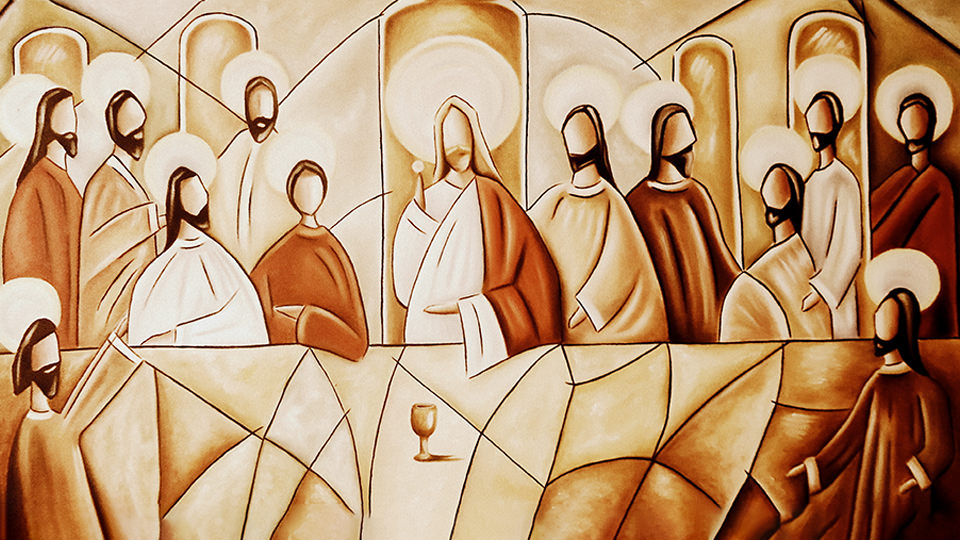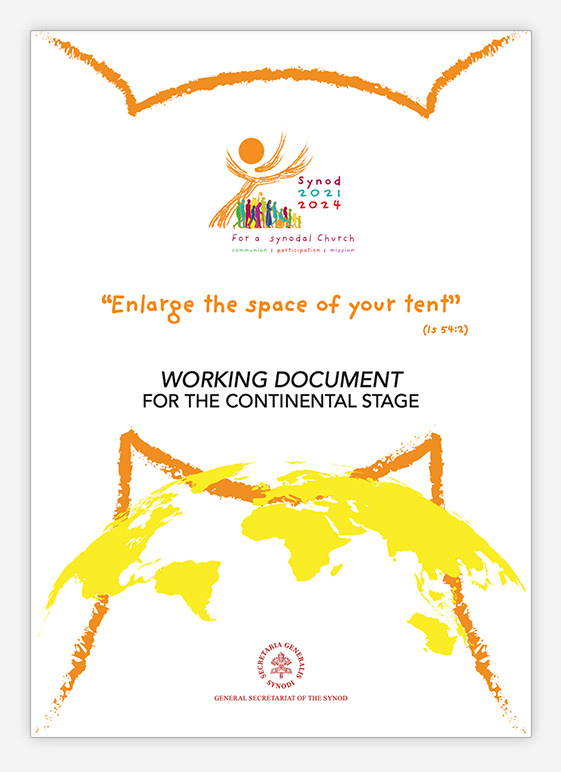

Synod as Traditioning: Part One
Matthew Neugebauer
Tuesday, December 13, 2022

Image by Martha Martinez on Cathopic
Handing on the Faith
As I was writing my reflection on the Working Document for the Continental Stage last month, I mulled over multiple ways to describe this synod process. In that post, I called it a "conversation." TheWorking Document represented the participants of the Diocesan Phase, in conversation with the regional assemblies of the Continental Stage. It is, of course, a three-way conversation: those regional assemblies will, in turn, speak to the Universal Phase in the form of Ordinary Synod sessions in Rome in 2023 and 2024. Similar to the way that the Working Document represented the Diocesan Phase, the “voice of the Continental Stage” will ultimately be represented in the preparatory document for the Ordinary Synod (called an Instrumentum Laboris). As I outline the overall synod timeline like that, I can't help but notice the linearity of it, the sense of movement: the Diocesan Phase hands on its work to the Continental Stage, which hands on its work to the Universal Phase. As I brought up in my earlier reflection, this linearity resonates with Gaudium et Spes and its theme of “pilgrimage.” This is a “synodal path,” a journey we take “on the way together,” and one that, hopefully, doesn’t leave any voices behind. (The extra year between Synod sessions is meant to give Universal Phase participants time to “double back” and consult with participants at the diocesan and continental levels.)
This linearity, this “handing on” to the next step, gets me thinking of the Synod on Synodality not just as a "conversation” but also as a "traditioning process." What do I mean by that?
The main word you'll notice is "traditioning," as in, the noun, “Tradition.” I do mean to refer to the process by which Sacred Tradition is developed over time. This path has always involved synods: Deacon Pedro helpfully recounted the historic role of Ecumenical Councils—the most authoritative expression of synodality—in honing our understanding of doctrine, of receiving the Faith of the Church.
More specifically though, I mean the verb, the act of “traditioning.” The Latin verb trado literally means "to hand down" or "to hand over." As a verb, it doesn’t have a direct English cognate; the closest we get is the word "to betray.” “Tradition” shares that Latin root with “betray,” but has a far more positive connotation. St. Paul plays fancifully with those light and dark connotations (with the Greek forms of the words, of course), when describing the Holy Eucharist:
As I outline the overall synod timeline like that, I can't help but notice the linearity of it, the sense of movement: the Diocesan Phase hands on its work to the Continental Stage, which hands on its work to the Universal Phase. As I brought up in my earlier reflection, this linearity resonates with Gaudium et Spes and its theme of “pilgrimage.” This is a “synodal path,” a journey we take “on the way together,” and one that, hopefully, doesn’t leave any voices behind. (The extra year between Synod sessions is meant to give Universal Phase participants time to “double back” and consult with participants at the diocesan and continental levels.)
This linearity, this “handing on” to the next step, gets me thinking of the Synod on Synodality not just as a "conversation” but also as a "traditioning process." What do I mean by that?
The main word you'll notice is "traditioning," as in, the noun, “Tradition.” I do mean to refer to the process by which Sacred Tradition is developed over time. This path has always involved synods: Deacon Pedro helpfully recounted the historic role of Ecumenical Councils—the most authoritative expression of synodality—in honing our understanding of doctrine, of receiving the Faith of the Church.
More specifically though, I mean the verb, the act of “traditioning.” The Latin verb trado literally means "to hand down" or "to hand over." As a verb, it doesn’t have a direct English cognate; the closest we get is the word "to betray.” “Tradition” shares that Latin root with “betray,” but has a far more positive connotation. St. Paul plays fancifully with those light and dark connotations (with the Greek forms of the words, of course), when describing the Holy Eucharist:
“For I received from the Lord what I also handed on to you, that the Lord Jesus, on the night he was handed over, took bread…” (1 Corinthians 11:23, NAB)He repeats this expression at the beginning of his great meditation on the resurrection of Christ in chapter 15:
“For I handed on to you as of first importance what I also received: that Christ died for our sins in accordance with the scriptures; that he was buried; that he was raised on the third day in accordance with the scriptures…” (1 Corinthians 15:3-4, NAB)It’s critical that 1 Corinthians 15 is ultimately about the resurrection of Christ, since the first doctrine that gets "handed on…as of first importance" among Christians is the belief that Jesus rose from the dead. Where did we, the Church, receive this belief in the Resurrection? Where did we learn that it was of "first importance?" And where did we receive the Church's belief about the Eucharist? A better question is "from whom" did we receive these things? St. Paul continues:
“For I handed on to you as of first importance what I also received:... that he appeared to [Peter], then to the Twelve. After that, he appeared to more than five hundred brothers at once, most of whom are still living, though some have fallen asleep. After that he appeared to James, then to all the apostles. Last of all, as to one born abnormally, he appeared to me.” (1 Corinthians 15:3, 5-8).From whom did we, and those “five hundred brothers” that comprise the first flowering of the Catholic Church, get our belief in the resurrection of Christ? The answer, as we can see, is from the Apostles. But these Apostles were, first of all, disciples of Jesus, those who walked and talked with Him, sat next to Him at the Last Supper on that night he was handed over, and who, with those five hundred other people, saw Him after the Resurrection. That number would then expand to three thousand people who encountered the Risen Christ in the power of the Holy Spirit, in person, at Pentecost. (Acts 2:41) Finally St. Paul himself, who needed God to literally knock him off his high horse on the way to Damascus, also had just as personal an encounter. (Acts 9:1-9) In short, we received our faith from those who had experienced the Triune God first-hand. This brings me back to the Synod on Synodality, two millennia later. While the Apostles and others in the first century experienced God and heard God, it isn't as if God stopped talking. St. Paul, St. Peter, St. James and the rest of the New Testament writers may have been the last ones to hear God with the authority of inspired Scripture, but they were by no means the last to experience the power of the Holy Spirit in person. The Church exists within the miracle of Easter and Pentecost. When you are baptized in the name of this Triune God, you join in the Apostles’ encounter with the Risen Christ and His Holy Spirit in the Upper Room. Which means that you too, experience this God, two millennia later. Through this encounter, God has given you something to say, something to hand on to the future of the Church, something to contribute to its Living Tradition in the present. The synodal path is about welcoming your voice along for the ride. Next up are Parts Two and Three, where I’ll explore more of what it might mean for lay people to contribute to the Living Tradition through the synodal path.
Related Articles:
<<













